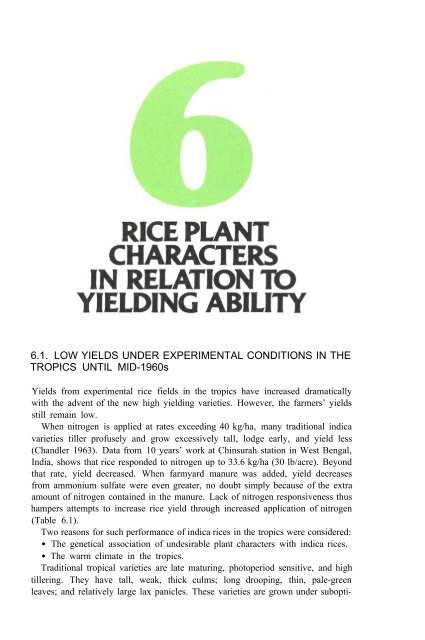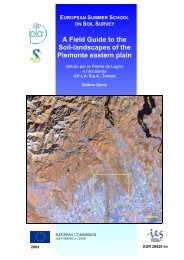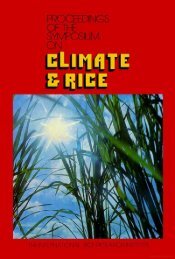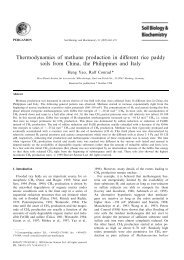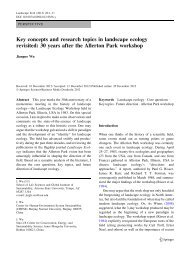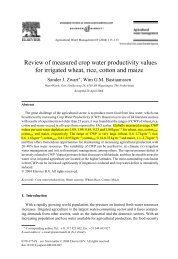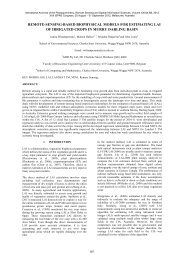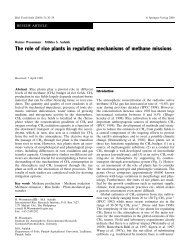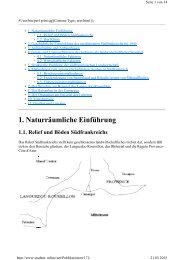- Page 3 and 4:
FOREWORD Rice is vital to more than
- Page 5 and 6:
CONTENTS Foreword Preface GROWTH AN
- Page 7 and 8:
3.2. Adaptation to Submerged Soils
- Page 9 and 10:
4.5. Corrective Measures for Nutrit
- Page 11 and 12:
1 .1. OUTLINE OF THE LIFE HISTORY T
- Page 13 and 14:
GROWTH AND DEVELOPMENT OF THE RICE
- Page 15 and 16:
GROWTH AND DEVELOPMENT OF THE RICE
- Page 17 and 18:
GROWTH AND DEVELOPMENT OF THE RICE
- Page 19 and 20:
GROWTH AND DEVELOPMENT OF THE RICE
- Page 21 and 22:
GROWTH AND DEVELOPMENT OF THE RICE
- Page 23 and 24:
GROWTH AND DEVELOPMENT OF THE RICE
- Page 25 and 26:
GROWTH AND DEVELOPMENT OF THE RICE
- Page 27 and 28:
GROWTH AND DEVELOPMENT OF THE RICE
- Page 29 and 30:
GROWTH AND DEVELOPMENT OF THE RICE
- Page 31 and 32:
GROWTH AND DEVELOPMENT OF THE RICE
- Page 33 and 34:
GROWTH AND DEVELOPMENT OF THE RICE
- Page 35 and 36:
GROWTH AND DEVELOPMENT OF THE RICE
- Page 37 and 38:
GROWTH AND DEVELOPMENT OF THE RICE
- Page 39 and 40:
GROWTH AND DEVELOPMENT OF THE RICE
- Page 41 and 42:
GROWTH AND DEVELOPMENT OF THE RICE
- Page 43 and 44:
GROWTH AND DEVELOPMENT OF THE RICE
- Page 45 and 46:
GROWTH AND DEVELOPMENT OF THE RICE
- Page 47 and 48:
GROWTH AND DEVELOPMENT OF THE RICE
- Page 49 and 50:
GROWTH AND DEVELOPMENT OF THE RICE
- Page 51 and 52:
GROWTH AND DEVELOPMENT OF THE RICE
- Page 53 and 54:
GROWTH AND DEVELOPMENT OF THE RICE
- Page 55 and 56:
GROWTH AND DEVELOPMENT OF THE RICE
- Page 57 and 58:
GROWTH AND DEVELOPMENT OF THE RICE
- Page 59 and 60:
GROWTH AND DEVELOPMENT OF THE RICE
- Page 61 and 62:
GROWTH AND DEVELOPMENT OF THE RICE
- Page 63 and 64:
GROWTH AND DEVELOPMENT OF THE RICE
- Page 65 and 66:
GROWTH AND DEVELOPMENT OF THE RICE
- Page 67 and 68:
GROWTH AND DEVELOPMENT OF THE RICE
- Page 69 and 70:
GROWTH AND DEVELOPMENT OF THE RICE
- Page 71 and 72:
GROWTH AND DEVELOPMENT OF THE RICE
- Page 73 and 74:
GROWTH AND DEVELOPMENT OF THE RICE
- Page 75 and 76:
66 FUNDAMENTALS OF RICE CROP SCIENC
- Page 77 and 78:
68 FUNDAMENTALS OF RICE CROP SCIENC
- Page 79 and 80:
70 FUNDAMENTALS OF RICE CROP SCIENC
- Page 81 and 82:
72 FUNDAMENTALS OF RICE CROP SCIENC
- Page 83 and 84:
74 FUNDAMENTALS OF RICE CROP SCIENC
- Page 85 and 86:
76 FUNDAMENTALS OF RICE CROP SCIENC
- Page 87 and 88:
78 FUNDAMENTALS OF RICE CROP SCIENC
- Page 89 and 90:
80 FUNDAMENTALS OF RICE CROP SCIENC
- Page 91 and 92:
82 FUNDAMENTALS OF RICE CROP SCIENC
- Page 93 and 94:
84 FUNDAMENTALS OF RICE CROP SCIENC
- Page 95 and 96:
86 FUNDAMENTALS OF RICE CROP SCIENC
- Page 97 and 98:
88 FUNDAMENTALS OF RICE CROP SCIENC
- Page 99 and 100:
90 FUNDAMENTALS OF RICE CROP SCIENC
- Page 101 and 102:
92 FUNDAMENTALS OF RICE CROP SCIENC
- Page 103 and 104:
94 FUNDAMENTALS OF RICE CROP SCIENC
- Page 105 and 106:
96 FUNDAMENTALS OF RICE CROP SCIENC
- Page 107 and 108:
98 FUNDAMENTALS OF RICE CROP SCIENC
- Page 109 and 110:
100 FUNDAMENTALS OF RICE CROP SCIEN
- Page 111 and 112:
102 FUNDAMENTALS OF RICE CROP SCIEN
- Page 113 and 114:
104 FUNDAMENTALS OF RICE CROP SCIEN
- Page 115 and 116:
106 FUNDAMENTALS OF RICE CROP SCIEN
- Page 117 and 118:
108 FUNDAMENTALS OF RICE CROP SCIEN
- Page 119 and 120:
110 FUNDAMENTALS OF RICE CROP SCIEN
- Page 121 and 122:
112 FUNDAMENTALS OF RICE CROP SCIEN
- Page 123 and 124:
114 FUNDAMENTALS OF RICE CROP SCIEN
- Page 125 and 126:
116 FUNDAMENTALS OF RICE CROP SCIEN
- Page 127 and 128:
118 FUNDAMENTALS OF RICE CROP SCIEN
- Page 129 and 130:
120 FUNDAMENTALS OF RICE CROP SCIEN
- Page 131 and 132:
122 FUNDAMENTALS OF RICE CROP SCIEN
- Page 133 and 134:
124 FUNDAMENTALS OF RICE CROP SCIEN
- Page 135 and 136:
126 FUNDAMENTALS OF RICE CROP SCIEN
- Page 137 and 138:
128 FUNDAMENTALS OF RICE CROP SCIEN
- Page 139 and 140:
130 FUNDAMENTALS OF RICE CROP SCIEN
- Page 141 and 142:
132 FUNDAMENTALS OF RICE CROP SCIEN
- Page 143 and 144:
134 FUNDAMENTALS OF RICE CROP SCIEN
- Page 145 and 146:
136 FUNDAMENTALS OF RICE CROP SCIEN
- Page 147 and 148:
138 FUNDAMENTALS OF RICE CROP SCIEN
- Page 149 and 150:
140 FUNDAMENTALS OF RICE CROP SCIEN
- Page 151 and 152:
142 FUNDAMENTALS OF RICE CROP SCIEN
- Page 153 and 154:
144 FUNDAMENTALS OF RICE CROP SCIEN
- Page 155 and 156:
146 FUNDAMENTALS OF RICE CROP SCIEN
- Page 157 and 158:
148 FUNDAMENTALS OF RICE CROP SCIEN
- Page 159 and 160:
150 FUNDAMENTALS OF RICE CROP SCIEN
- Page 161 and 162:
152 FUNDAMENTALS OF RICE CROP SCIEN
- Page 163 and 164:
154 FUNDAMENTALS OF RICE CROP SCIEN
- Page 165 and 166:
156 FUNDAMENTALS OF RICE CROP SCIEN
- Page 167 and 168:
158 FUNDAMENTALS OF RICE CROP SCIEN
- Page 169 and 170: 160 FUNDAMENTALS OF RICE CROP SCIEN
- Page 171 and 172: 162 FUNDAMENTALS OF RICE CROP SCIEN
- Page 173 and 174: 164 FUNDAMENTALS OF RICE CROP SCIEN
- Page 175 and 176: 166 FUNDAMENTALS OF RICE CROP SCIEN
- Page 177 and 178: 168 FUNDAMENTALS OF RICE CROP SCIEN
- Page 179 and 180: 170 FUNDAMENTALS OF RICE CROP SCIEN
- Page 181 and 182: 172 FUNDAMENTALS OF RICE CROP SCIEN
- Page 183 and 184: 174 FUNDAMENTALS OF RICE CROP SCIEN
- Page 185 and 186: 176 FUNDAMENTALS OF RICE CROP SCIEN
- Page 187 and 188: 178 FUNDAMENTALS OF RICE CROP SCIEN
- Page 189 and 190: 180 FUNDAMENTALS OF RICE CROP SCIEN
- Page 191 and 192: 182 FUNDAMENTALS OF RICE CROP SCIEN
- Page 193 and 194: 184 FUNDAMENTALS OF RICE CROP SCIEN
- Page 195 and 196: 186 FUNDAMENTALS OF RICE CROP SCIEN
- Page 197 and 198: 188 FUNDAMENTALS OF RICE CROP SCIEN
- Page 199 and 200: 190 FUNDAMENTALS OF RICE CROP SCIEN
- Page 201 and 202: 192 FUNDAMENTALS OF RICE CROP SCIEN
- Page 203 and 204: 5.1. PHOTOSYNTHESIS 5.1.1. Photosyn
- Page 205 and 206: PHOTOSYNTHESIS AND RESPIRATION 197
- Page 207 and 208: Photosynthetic characteristics Meas
- Page 209 and 210: PHOTOSYNTHESIS AND RESPIRATION 201
- Page 211 and 212: PHOTOSYNTHESIS AND RESPIRATION 203
- Page 213 and 214: PHOTOSYNTHESIS AND RESPIRATION 205
- Page 215 and 216: PHOTOSYNTHESIS AND RESPIRATION 207
- Page 217 and 218: PHOTOSYNTHESIS AND RESPIRATION 209
- Page 219: PHOTOSYNTHESIS AND RESPIRATION 211
- Page 223 and 224: A traditional tall variety vs an im
- Page 225 and 226: 216 FUNDAMENTALS OF RICE CROP SCIEN
- Page 227 and 228: 218 FUNDAMENTALS OF RICE CROP SCIEN
- Page 229 and 230: 220 FUNDAMENTALS OF RICE CROP SCIEN
- Page 231 and 232: 222 FUNDAMENTALS OF RICE CROP SCIEN
- Page 233 and 234: 224 FUNDAMENTALS OF RICE CROP SCIEN
- Page 235 and 236: 226 FUNDAMENTALS OF RICE CROP SCIEN
- Page 237 and 238: 228 FUNDAMENTALS OF RICE CROP SCIEN
- Page 239 and 240: 230 FUNDAMENTALS OF RICE CROP SCIEN
- Page 241 and 242: 232 FUNDAMENTALS OF RICE CROP SCIEN
- Page 243 and 244: 234 FUNDAMENTALS OF RICE CROP SCIEN
- Page 245 and 246: 236 FUNDAMENTALS OF RICE CROP SCIEN
- Page 247 and 248: 238 FUNDAMENTALS OF RICE CROP SCIEN
- Page 249 and 250: 240 FUNDAMENTALS OF RICE CROP SCIEN
- Page 251 and 252: 242 FUNDAMENTALS OF RICE CROP SCIEN
- Page 253 and 254: 244 FUNDAMENTALS OF RICE CROP SCIEN
- Page 255 and 256: 246 FUNDAMENTALS OF RICE CROP SCIEN
- Page 257 and 258: Table 7.6. An example of high yield
- Page 259 and 260: 250 FUNDAMENTALS OF RICE CROP SCIEN
- Page 261 and 262: REFERENCES AGRICULTURAL POLICY STUD
- Page 263 and 264: 254 FUNDAMENTALS OF RICE CROP SCIEN
- Page 265 and 266: 256 FUNDAMENTALS OF RICE CROP SCIEN
- Page 267 and 268: 258 FUNDAMENTALS OF RICE CROP SCIEN
- Page 269 and 270: 260 FUNDAMENTALS OF RICE CROP SCIEN
- Page 271 and 272:
262 FUNDAMENTALS OF RICE CROP SCIEN
- Page 273 and 274:
264 FUNDAMENTALS OF RICE CROP SCIEN
- Page 275 and 276:
266 FUNDAMENTALS OF RICE CROP SCIEN
- Page 277 and 278:
268 FUNDAMENTALS OF RICE CROP SCIEN


